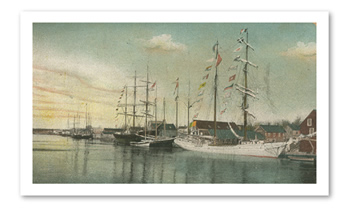Liverpool Then & Now
 Liverpool is a beautiful town of roughly 3300 situated on the South coast of Nova Scotia. The town is the principal commercial, financial, government and business service centre for Queens County on Nova Scotia’s south coast. As the main commercial, financial, and governmental hub for Queens County, Liverpool boasts a rich cultural and historical heritage. Historically a shipbuilding and fishing port, as well as a timber and mill town, its current industries include commercial seafood fishing, tourism, retail, restaurants, forestry, theatre, shipbuilding and repair. Tourism and culture continues to grow with visitors traveling the scenic “Lighthouse Route” between Halifax and Yarmouth. Liverpool is a beautiful town of roughly 3300 situated on the South coast of Nova Scotia. The town is the principal commercial, financial, government and business service centre for Queens County on Nova Scotia’s south coast. As the main commercial, financial, and governmental hub for Queens County, Liverpool boasts a rich cultural and historical heritage. Historically a shipbuilding and fishing port, as well as a timber and mill town, its current industries include commercial seafood fishing, tourism, retail, restaurants, forestry, theatre, shipbuilding and repair. Tourism and culture continues to grow with visitors traveling the scenic “Lighthouse Route” between Halifax and Yarmouth.
Please visit our Liverpool photo gallery located here. As a cultural oasis, Liverpool celebrates its past, present, and future with a variety of world-class festivals and events throughout the year. Liverpool International Theatre Festival, Astor Theatre scheduled events, Privateer Days & Hank Snow Tribute, Queens Place Emera Centre events and two theatre production companies, Winds of Change Dramatic Society and Mersey Rose Theatre Company. History : Today, Liverpool is called the “Port of Privateers,” in honour of its past as the home of successful private ship raiders. In 1755, following the expulsion of Acadians from the province, Governor Charles Lawrence invited New England residents to immigrate to Nova Scotia. Many new settlers came to live in the area, and 250 years ago helped officially incorporate the Town of Liverpool. These New England Planters (a British term for colonists) were described as “of excellent quality, courageous, hardy, resourceful, representing to a great degree their ancestors.” The American Revolution (1775 – 1783) created a difficult situation for the citizens of Liverpool who were torn between their loyalty to the King and their ties to family and friends in New England. However by 1776, it became easier for these new settlers to decide where their loyalties should lie. American privateers freely roamed the South Shore, ambushing merchant shipments, disrupting commerce, and occasionally stealing ships right out of Liverpool’s wharves. Seeing Liverpool’s economy at risk, and being desperate to defend their homes and their families, the proprietors of the town agitated for the right to retaliate against their aggressors. In 1777, Letters of Marque were granted to private citizens, giving Liverpudlians the right to raid enemy vessels in the name of the Crown and defence of their town – thus becoming privateers. |

